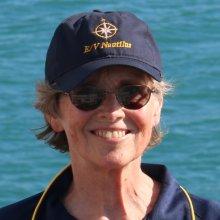
Susan Mills
Tell us about your work / research. What kinds of things do you do?
I work on larval dispersal and colonization in isolated deep-sea habitats such as hydrothermal vents. My particular area of specialization is the identification of larvae and young juveniles of vent species, particularly limpets, snails, and worms. I do these using traits that are visible through a microscope, but for some species, it is necessary to do a genetic analysis to confirm an identification.
What sparked your initial interest in your career?
When I was young, I read a great deal about the oceans and watched marine science specials on television. In high school, I got interested in biology and a college course on marine biology sparked my love of invertebrates.
Who influenced you or encouraged you the most?
Two scientists, I worked with were my strongest influences. Both set me challenges that I thought were beyond my capabilities and when I found I was able to do them, I realized that I had been limiting myself to low expectations.
What element of your work / study do you think is the most fascinating?
To me, the most exciting part of science is the ever-present possibility that you will discover something that no one else has found. It doesn't happen often, but when it does, there's nothing like it.
What other jobs led you to your current career?
Specimen museum helper, training catfish, marine worm culturing, studying population genetics of vent mussels, sorting of samples collected from the seafloor and the plankton, investigating settling behavior of worms and clams, hydrothermal vent larval identification guide author, running a visual plankton recorder in the Arctic, lots of fieldwork in coastal and deep-sea settings, etc.
What are your degrees and certifications?
Bachelor of Science in Biology, 1973
What are your hobbies?
I love to bike (I rode across Iowa this summer) and to spend time with my family (including my cat). Since I'm technically retired, science has now become a "hobby" and I still love it, especially without having to worry about grant funding for my salary.
What advice would you give to someone who wants to have a career like yours?
First of all, take as much math as you can. Pretty much everything in science requires a good understanding of math. Apart from that, take a variety of courses, not just in science. It's a mistake to narrow your options too early in your career and find out too late that you really wanted to do something else.
Expeditions
Susan participated in the following Ocean Exploration Trust expeditions:
